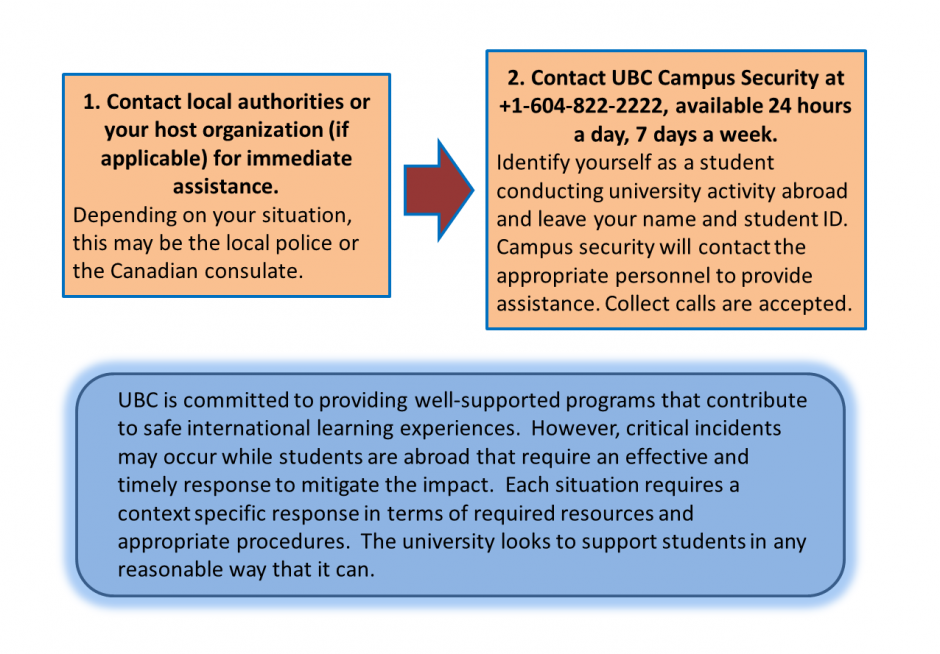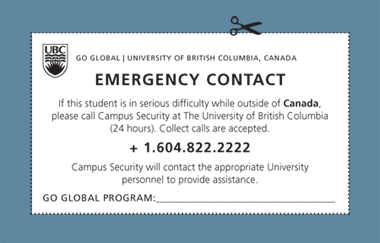
It is a good idea to be aware of the different kinds of emergency situations that could occur while you are abroad. These could include environmental (e.g., earthquakes), personal (petty theft), or health (illness) safety issues. Understanding the different situations will help you properly prepare an emergency plan.
Some things to remember:
- Think about possible emergency situations that could occur in your host country and plan accordingly
- Print and complete your Emergency Wallet Card
- Keep the Emergency Wallet Card on you at all times while you are abroad
- Find out and make note of the emergency phone number to call in your host country (It may not be 9-1-1)
Emergency Consular Assistance
There are a few ways to access emergency consular assistance while you are abroad:
For emergency help during business hours, call your nearest embassy or consulate directly.
If you call outside of office hours, your telephone call will automatically be transferred to a consular officer in Ottawa, or you will be asked to leave a message for a return call. Under normal circumstances, an operations officer will get back to you within 15 minutes. However, this delay may be longer during large-scale emergencies.
You can also:
- Contact Global Affairs Emergency Watch and Response Centre in Ottawa 24 hours a day, 7 days a week. Send an email, sos@international.gc.ca or make a collect call 1.613.996.8885
- From within Canada, call 1.800.267.6788, or 613.944.6788
Again, you may be asked to leave a message. Please follow the instructions carefully and, under normal circumstances, an operations officer will get back to you within 15 minutes.
In cases of Sexual Assault
What is sexual assault? Sexual assault is a crime and has various impacts on individuals lives. Due to the stigma’s surrounding sexual violence many people find it hard to discuss their experience or access support. It is important to remember that ANYONE can be a survivor of sexual assault and that anyone can be a perpetrator of sexual assault. It can happen anywhere, whether it’s at home or in a foreign location.
If you are a survivor of sexual assault, please remember to contact:
- Go Global
- Your host institution/program coordinator
- and the Sexual Assault Support Centre (SASC) as soon as possible.
Emergency Preparation
Scroll through the slides for some tips on how to prepare yourself in case of emergency situations.
Sexual Violence
There are many myths within society that sexual assaults are perpetrated by a stranger, when actually 84% of sexual assaults are perpetrated by someone that the victim knows. Sexual assault is about power and often those perpetrating sexual assault or abuse are those in positions of authority. Sexual assault most often occurs in a private setting such as at home, work or in an educational setting.
When you are away from home or on international university activity, it can be disorientating and difficult adapting to your new environment. It is important to consider your surroundings and to create safe spaces for yourself and be aware of the resources available to you. Different countries have different community resources available when it comes to sexualized violence, but it’s important to know what is available to you, and to know that it’s ok to access support. If you aren’t sure where to find those resources you can connect with the institution that you are visiting, UBC or The SASC (Sexual Assault Support Centre).
If you are supporting a survivor of sexual assault it is important to listen to their needs, not make assumptions or judgments, don’t ask too many questions and help them find resources. It is also important to set your own boundaries and to take care of yourself.
Sexual assaults are not isolated, preventable incidents they are a product of reinforced lifelong privilege and safety is different for everyone. Having an awareness of your surroundings, resources, and a safety plan can be helpful. For more information on sexual assault prevention and safety contact The SASC.’
Emergency Wallet Card
An Emergency Wallet Card is available for students which includes the UBC Campus Security emergency contact number.
- Before leaving, print and fill in the required information on the card (click on the card below to print).
- Include your travel medical insurance policy number and the provider’s worldwide telephone number and your country’s Canadian consulate/embassy telephone number on the back of the card.
- Keep the card with you at all times.

